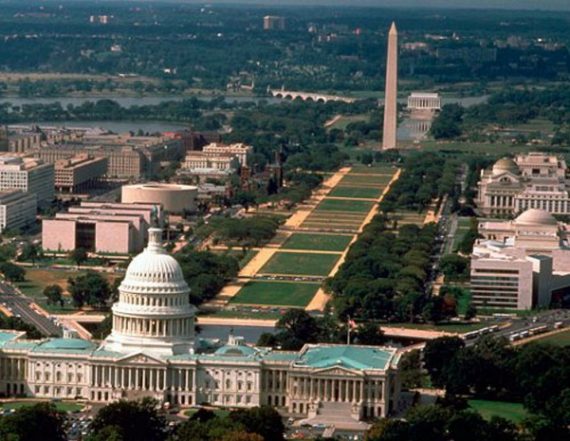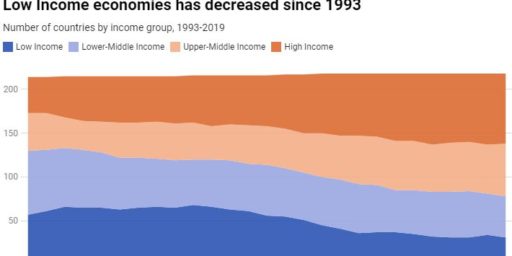Seven Of The Ten Wealthiest Counties In The U.S. Are In Washington, D.C. Area
If you live in the Washington, D.C. area, the odds are that you’ve been far more shielded from the impact of the Great Recession than residents of many other parts of the country. That is due, obviously, in no small part to to the presence of the Federal Government and the various businesses that have grown up to provide services to the government, or to influence it to move policy in a certain direction. While Washington, D.C. proper hasn’t necessarily benefited economically, its Maryland and Virginia suburbs most certainly have:
The Washington region has emerged from the recession looking even more affluent compared with the rest of the country, boasting seven of the 10 counties with the highest household incomes in the nation, new census numbers show.
With a median household income surpassing $119,000, Loudoun County heads the list. Fairfax County, at nearly $106,000, is second. Both have held the same positions for several years running.
More surprising, Arlington County leapfrogged from the fifth spot to third, with a median household income of almost $101,000, a $6,000 gain in one year. Four in 10 households in the county are single person, leaving Arlington with a relatively small share of residents whose affluence comes from two incomes, compared with Loudoun and Fairfax.
Other counties in the top 10 are Howard, Prince William, Fauquier and Montgomery, which had dropped out of it in 2010. Among states, Maryland has the nation’s highest household income level, and Virginia is ninth.
The rankings in the 2011 American Community Survey released Thursday expand Washington’s dominance among high-income households, reflecting a regional economy that was largely cushioned as the recession yanked down income levels elsewhere. Household incomes rose in most counties around Washington last year, even as they continued to sink around the country.
The stability of an economy built on the pillars of the federal government, its legions of contractors and a flourishing high-tech sector is evident in the income rankings.
In 2007, before the recession began, five counties in suburban Washington made it into the top 10. By 2010, there were six. The seven in the latest ranking is an all-time high.
“It’s not only that we have low unemployment and a lot of dual-income ,” said Stephen Fuller, director of the Center for Regional Analysis at George Mason University. “We lost a few government jobs, but not the high-paying, professional business-service jobs that are still growing, if not as fast as they used to. Since the rest of the country is in such poor shape, we just have to show a little bit of growth here, and we look pretty good.”
(…)
The District, which the census compares to both states and counties, has seen its ranking shoot up in the last five years as its median household income has risen from $54,000 to about $63,000. When compared with states, it rose from 16th to fifth. Compared with counties, it ranks 125, up from 247.
Peter Suderman comments:
This gives a bit of a sense of how economically disconnected the nation’s capitol city is from much of the rest of the country. It also highlights how much money is flowing into the Washington area, where the economy is largely built around supporting the functions of the federal government. And it tells you something about where American businesses invested during the recession: in political influence and power. Which reveals who actually benefits from economic recovery measures and massive regulatory overhauls. When Washington’s power grows, so does the value of K Street, and, in turn, so do real-estate prices in the surrounding area.
That pretty much sums it up, I would say. There’s something not entirely healthy with so much wealth being tied up in something that is ultimately as economically unproductive as government influence pedaling and rent seeking, and it certainly doesn’t bode well for our economy that Suburban Maryland and Northern Virginia have essentially gotten rich by sucking money from the rest of the country via taxation. This is an unsustainable situation because, at some point, someone has to do the productive work necessary to pay those taxes.





should be “government, government influence peddling and rent seeking”
Government is necessary but it is not economically productive. And when enlarged, it makes government influence peddling and rent seeking very profitable taking resources from the productive economy and basically concentrating it in “redistribution”. This is why government must be kept necessarily small. Smallness restricts the costs government imposes on the economy and limits the profitability of influence peddling and rent seeking.
At this point, the People will have to take back these misallocated resources and tear down the government trough. No doubt many here will heckle this idea as unconscionable as they’ve grown to love the government teat. Of course, they fear for their future should the government they belong to stop providing them their
supplementsubsistence.@JKB:
Seems to be economically producrtive for Maryland and Virginia – and every other capital region every country in the history of the world.
That last point is kinda telling, don’t you think?
@SKI:
It is pretty productive in any of the university driven innovation zones as well.
Well, business is good there.
BTW, this condition is not unique to Washington, DC. The counties containing state capitals tend to have lower unemployment, higher wages, and higher property values, too.
Yeah want a city with a great, thriving, stable economy? just found a top class research University and wait 75 years ….
Probably the greatest irony with all this is that D.C.-area liberals who are getting high either directly or indirectly on taxpayer dollars, and living in lily-white, gentrified suburban neighborhoods, during a period of massive unemployment and foreclosures, especially among urban racial minorities, would not be able even to grasp the various layers of irony. You’d have to explain it all to them, using of course a puppet show and a flow chart.
That aside, when Alexis de Tocqueville said that the “American Republic will endure until the day Congress discovers that it can bribe the public with the public’s money,” he wasn’t just whistlin’ Dixie.
@Tsar Nicholas:
Tocquevile wrote no such thing. The quote is bogus, though it has been attributed to Tocqueville by generations of lazy, ignorant thinkers for about 50 years by now. If you believe the quote is genuine, please provide a page cite to a reputable copy of “Democracy in America.”
So If I’m understanding this correctly, conservatives and other fans of small government should be calling for military entitlement reform. It’s not food stamps, welfare, unemployment benefits, or Medicaid that’s filling those seven counties with gated communities, exclusive subdivisions, and 8,000-square-foot homes.
I find the disparity of incomes between N. VA and the rest of the state shocking! I think that the government needs to forcibly move some of those high-income folk down to poorer parts of the state for a better distribution of incomes. Considering a redistribution distribution.
“….it certainly doesn’t bode well for our economy that Suburban Maryland and Northern Virginia have essentially gotten rich by sucking money from the rest of the country via taxation.”
Maryland (35) And Virginia (49) are hardly at the top of the list of states benefiting from Federal aid on a per capita basis. When it comes to sucking up Federal money, nobody tops places like Alaska….
http://www.census.gov/compendia/statab/2012/ranks/rank22.html
This same discussion happens every time this statistic comes out. I think it’s obvious any national capital region is going to be insulated from the economic swings that affect the rest of the country. The business of government is pretty steady, and it’s usually steadily growing.
However, there are some other factors at play. For one, the D. C. metro area has some of the highest home prices in the country. When a 1200-square-foot three-bedroom bungalow costs $400,000, it becomes necessary for both husband and wife to work, and if they earn around $50K each, well, there’s your $100K in household income.
Another factor is educational attainment. Many government jobs, and jobs with government contractors, require at least a Bachelor’s degree. Consequently, the D. C. metro has the highest percentage of residents with a Bachelor’s in the country, and also with a Master’s. Of course, that also means higher salaries.
Finally, contra Tsar Nicholas’ assertion of “lily-white, gentrified suburban neighborhoods,” this area is among the most ethnically diverse in the country. Even here in wealthy Fairfax, half the families on my street are non-white or bi-racial.
@John Burgess: Trust me, they are moving further from DC on their own. You can drive an hour from DC and still see subdivisions of huge houses in VA. The wealth goes with them and trickles down to the locals. Somebody has to maintain all those golf courses.
@Mikey: Although somehow Prince George’s county, the blackest county in the country and where I grew up and went to public school, remains left in the dust in terms of income and home values despite being adjacent to DC. So there is some racial factor involved. The VA counties may not be lily-white, but the minorities are more likely to be Asian than black.
@ASK: MD and VA might not benefit the most from direct payments from the federal government but they definitely top the list in sucking money from the rest of the country. Not that I’m complaining since I am a govt contractor. I would be interested in seeing how many private sector worker’s federal taxes it takes to pay my salary. I would guess it would take a nice chunk of an entire county is rural Mississippi, or maybe the taxes of the employees of 100 or so Taco Bells…
Someone should graph that out.
@J-Dub: Yeah, PG County is well down the list at #69, although up from #76 last year.
What about Prince George’s County? The largest concentration of black wealth in the country.
so the myth of the well heeled fat bureaucrats is actually true? who knew… are they’re so insulated from reality they can’t help anyone but themselves?